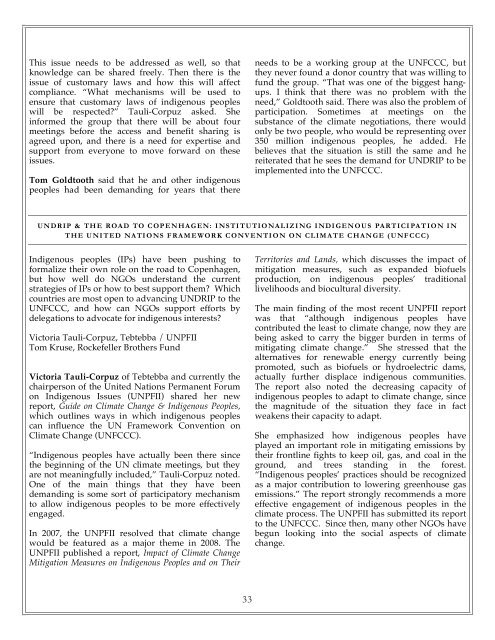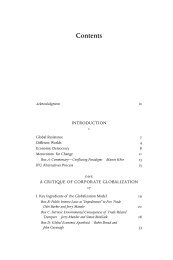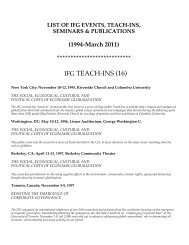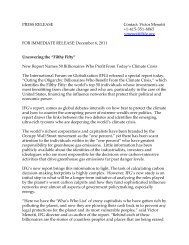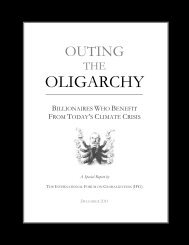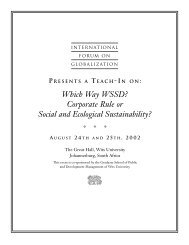UNDRIP Report - English FINAL - International Forum on Globalization
UNDRIP Report - English FINAL - International Forum on Globalization
UNDRIP Report - English FINAL - International Forum on Globalization
Create successful ePaper yourself
Turn your PDF publications into a flip-book with our unique Google optimized e-Paper software.
This issue needs to be addressed as well, so that<br />
knowledge can be shared freely. Then there is the<br />
issue of customary laws and how this will affect<br />
compliance. “What mechanisms will be used to<br />
ensure that customary laws of indigenous peoples<br />
will be respected?” Tauli-Corpuz asked. She<br />
informed the group that there will be about four<br />
meetings before the access and benefit sharing is<br />
agreed up<strong>on</strong>, and there is a need for expertise and<br />
support from every<strong>on</strong>e to move forward <strong>on</strong> these<br />
issues.<br />
Tom Goldtooth said that he and other indigenous<br />
peoples had been demanding for years that there<br />
needs to be a working group at the UNFCCC, but<br />
they never found a d<strong>on</strong>or country that was willing to<br />
fund the group. “That was <strong>on</strong>e of the biggest hangups.<br />
I think that there was no problem with the<br />
need,” Goldtooth said. There was also the problem of<br />
participati<strong>on</strong>. Sometimes at meetings <strong>on</strong> the<br />
substance of the climate negotiati<strong>on</strong>s, there would<br />
<strong>on</strong>ly be two people, who would be representing over<br />
350 milli<strong>on</strong> indigenous peoples, he added. He<br />
believes that the situati<strong>on</strong> is still the same and he<br />
reiterated that he sees the demand for <str<strong>on</strong>g>UNDRIP</str<strong>on</strong>g> to be<br />
implemented into the UNFCCC.<br />
UN DRIP & TH E ROA D TO C OP E N HA G EN: I NS TI TUTIONA LIZI NG I NDI GE N OUS PA RTICI PA T ION I N<br />
THE U NI TED NA TI O NS F RA M E WOR K C O NV EN TI O N O N CLIM A TE C HA N GE ( U NF CC C)<br />
Indigenous peoples (IPs) have been pushing to<br />
formalize their own role <strong>on</strong> the road to Copenhagen,<br />
but how well do NGOs understand the current<br />
strategies of IPs or how to best support them? Which<br />
countries are most open to advancing <str<strong>on</strong>g>UNDRIP</str<strong>on</strong>g> to the<br />
UNFCCC, and how can NGOs support efforts by<br />
delegati<strong>on</strong>s to advocate for indigenous interests?<br />
Victoria Tauli-Corpuz, Tebtebba / UNPFII<br />
Tom Kruse, Rockefeller Brothers Fund<br />
Victoria Tauli-Corpuz of Tebtebba and currently the<br />
chairpers<strong>on</strong> of the United Nati<strong>on</strong>s Permanent <str<strong>on</strong>g>Forum</str<strong>on</strong>g><br />
<strong>on</strong> Indigenous Issues (UNPFII) shared her new<br />
report, Guide <strong>on</strong> Climate Change & Indigenous Peoples,<br />
which outlines ways in which indigenous peoples<br />
can influence the UN Framework C<strong>on</strong>venti<strong>on</strong> <strong>on</strong><br />
Climate Change (UNFCCC).<br />
“Indigenous peoples have actually been there since<br />
the beginning of the UN climate meetings, but they<br />
are not meaningfully included,” Tauli-Corpuz noted.<br />
One of the main things that they have been<br />
demanding is some sort of participatory mechanism<br />
to allow indigenous peoples to be more effectively<br />
engaged.<br />
In 2007, the UNPFII resolved that climate change<br />
would be featured as a major theme in 2008. The<br />
UNPFII published a report, Impact of Climate Change<br />
Mitigati<strong>on</strong> Measures <strong>on</strong> Indigenous Peoples and <strong>on</strong> Their<br />
Territories and Lands, which discusses the impact of<br />
mitigati<strong>on</strong> measures, such as expanded biofuels<br />
producti<strong>on</strong>, <strong>on</strong> indigenous peoples’ traditi<strong>on</strong>al<br />
livelihoods and biocultural diversity.<br />
The main finding of the most recent UNPFII report<br />
was that “although indigenous peoples have<br />
c<strong>on</strong>tributed the least to climate change, now they are<br />
being asked to carry the bigger burden in terms of<br />
mitigating climate change.” She stressed that the<br />
alternatives for renewable energy currently being<br />
promoted, such as biofuels or hydroelectric dams,<br />
actually further displace indigenous communities.<br />
The report also noted the decreasing capacity of<br />
indigenous peoples to adapt to climate change, since<br />
the magnitude of the situati<strong>on</strong> they face in fact<br />
weakens their capacity to adapt.<br />
She emphasized how indigenous peoples have<br />
played an important role in mitigating emissi<strong>on</strong>s by<br />
their fr<strong>on</strong>tline fights to keep oil, gas, and coal in the<br />
ground, and trees standing in the forest.<br />
“Indigenous peoples’ practices should be recognized<br />
as a major c<strong>on</strong>tributi<strong>on</strong> to lowering greenhouse gas<br />
emissi<strong>on</strong>s.” The report str<strong>on</strong>gly recommends a more<br />
effective engagement of indigenous peoples in the<br />
climate process. The UNPFII has submitted its report<br />
to the UNFCCC. Since then, many other NGOs have<br />
begun looking into the social aspects of climate<br />
change.<br />
33


